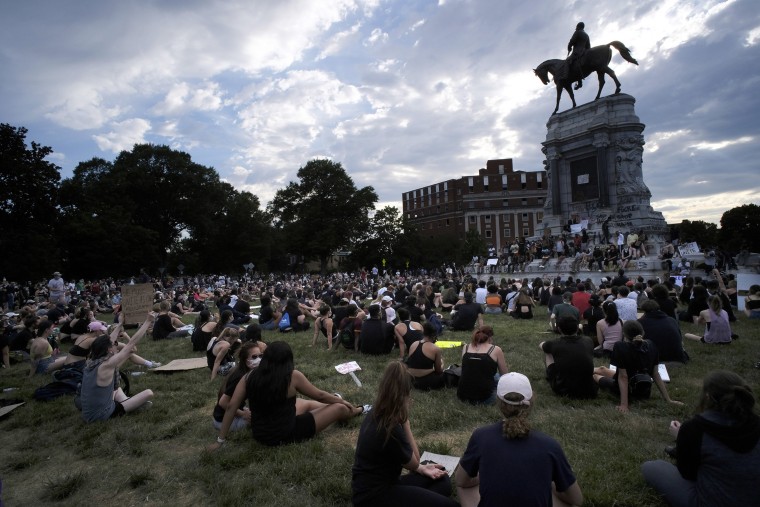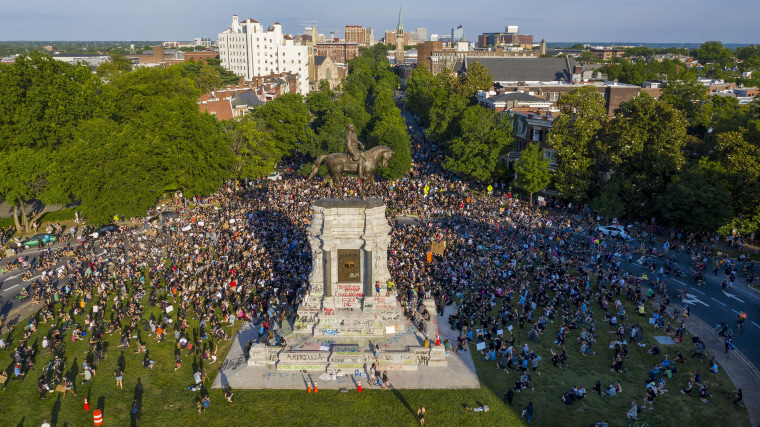Since 1890, a statue of Confederate Gen. Robert E. Lee has watched over the heart of Richmond, Virginia, once the capital of the Confederacy, and to this day, a place for protesters who consider the historic marker a shameful symbol of the nation's past.
Now, the longstanding tribute to Lee, along with four other statues depicting Confederate figures that line a two-mile stretch of Monument Avenue, will be removed in the coming weeks and placed into storage, Gov. Ralph Northam announced Thursday. An exact time frame was not immediately given, but he added that the community will help decide what to do with it.
It's an extraordinary move, historians say, amid the larger backdrop over the debate to dismantle Confederate monuments, recently reignited by the wave of national protests and turmoil over the death of George Floyd, a black man, in Minneapolis police custody.
"Richmond is no longer the capital of the Confederacy," Richmond Mayor Levar Stoney, a Democrat who took office in 2017, said at a news conference with Northam.
During the recent protests in Richmond related to Floyd's death, the base of the Lee statue was tagged with messages against white supremacy and of "Black Lives Matter."

Also depicted along Monument Avenue are Confederate leaders J.E.B. Stuart, Stonewall Jackson, Jefferson Davis and Matthew Fontaine Maury.
While the Lee statue is on state property, the other four are on city land. Stoney had previously voiced his support for taking down all of the city's Confederate monuments.
"We have two pandemics in our country right now: COVID-19 and racism," Stoney said. "One is six months old, the other is 400 years old. Both are lethal, especially for black and brown people."
The weight of Northam's decision is significant: Monument Avenue is listed on the National Register of Historic Places as a National Historic Landmark District, it's home to celebrations in honor of Lee's birthday and to Confederate-themed events, and is a local attraction for tourists and history buffs.
"Today, we're here to be honest about our past and talk about our future," Northam, a Democrat who lives in Richmond, the commonwealth's capital, said. "I'm no historian, but I strongly believe we have to confront where we've been in order to get where we're going."
Full coverage of George Floyd’s death and protests around the country
Northam has faced calls to commit to racial justice issues after he came under fire last year when photos surfaced of a person in blackface and another in a Ku Klux Klan robe on his personal page of his Eastern Virginia Medical School yearbook decades earlier. Amid the fallout and defying demands that he resign, Northam denied being in the picture after he "had a chance to step back, take a deep breath" and study it.
Northam said Thursday that the Lee statue, about six stories tall and 12 tons sitting on a large pedestal, is unique because it is state-owned. Taking it down shows how Virginia can rectify the racial and slave-owning ills of its past, he added.
"When a young child looks up and sees something that big and prominent, she knows it must be important. When it's the biggest thing around, it sends a clear message: This is what we value the most," Northam said. "That's not true anymore."
He added that a decision must be made for what, if anything, can replace Lee's statue on the pedestal.
Monument Avenue will still be home to a tribute to Arthur Ashe, the legendary black tennis champion and a native son of Richmond, that was added in 1996. (Ashe's statue also drew criticism from detractors who saw no relationship between it and the others on the avenue.)
While the debate over the Confederate statues has persisted for decades, it flared up following the deadly white nationalist and alt-right demonstration in Charlottesville. The "Unite the Right" rally was held in protest of the planned removal of a statue of Lee in a Charlottesville park.
Earlier this year, Virginia's Democratic-led House and Senate voted to allow local governments to have the power to decide whether to remove Confederate statues from public property.
According to state officials, Virginia has more than 200 public memorials to the Confederacy, and several communities have said they would move ahead with plans to take them away when the law goes into effect July 1, including in Richmond.
Download the NBC News app for full coverage and alerts on this story
Some statues have already been coming down if they're privately owned.
In Alexandria, Virginia, on Tuesday, the statue of a Confederate soldier in an intersection of the city was removed by its owner, the United Daughters of the Confederacy. The removal had been planned for July, NBC Washington reported, but "given events, they accelerated it," Mayor Justin Wilson said.
The United Daughters of the Confederacy, which saw its Richmond offices burned amid the recent protests, could not immediately be reached for comment. The group has previously said the monuments are important and affirm American history.
Meanwhile, cities in other states are also moving ahead with removing Confederate symbols, but not without challenges.
On Monday, Birmingham, Alabama, began the task of removing its 115-year-old Confederate Soldiers and Sailors monument from a public park. The monument had been defaced during a Floyd-related protest the night before, and Mayor Randall Woodfin made a pact to take it down within 24 hours in order to squelch further unrest.
But on Tuesday, state Attorney General Steve Marshall filed a civil lawsuit against the city, writing the move required a waiver, and without one, it has violated Alabama's monument preservation law and the city must pay a fine.
In response, Woodfin said Wednesday on the "TODAY" show that "we don't have time to worry about something that's not working for our city and relegates black people to property and slavery. It's important that we take this down and move forward."
President Donald Trump in 2017 railed against removing what he called "beautiful" Confederate statues and monuments, tweeting that it was sad to see the "history and culture" of the country being "ripped apart."
Following Northam's announcement, Andrew Bennett Morehead, a spokesman for the Virginia division of the Sons of Confederate Veterans, said the group would be looking into the constitutional and legal authority to remove the statues without the state Legislature's approval.
According to the governor's office, he is acting under his executive authority and a section of the Virginia code that provides him "the sole authority to approve the removal of a work of art owned by the Commonwealth upon submission of a plan to do so."
But Morehead said the statues are works of art, which is why they shouldn't be removed, and they are reminders that the "military prowess" of Lee and Jackson are still studied today.
He added that the economic loss of tourism and the cost of removing them, especially during a pandemic, are going to be detrimental. In addition, "to think you're going to remove these monuments and think it's going to lead to racial harmony — you're looking at a unicorn," Morehead said. His group has about 3,000 members in Virginia.
But some historians and scholars say that the movement is already afoot across the country, and that for communities, they would rather remove monuments as a way to address the nation's history than to continue a "false narrative" of the "Lost Cause" — an ideology of Southern heritage groups to justify why the Civil War was necessary.
Northam said Thursday that Virginia will "no longer preach a false version of history" and "in 2020, we can no longer tolerate a system that was based on buying and selling of people."
Julian Hayter, a historian and associate professor of leadership studies at the University of Richmond, said Confederate statues are forever linked to the "Lost Cause," and society at large is able to associate white supremacy and the institution of racism during the Jim Crow era of the late 19th and early 20th centuries with what's happening now, including surrounding the complaints of police brutality and a disparate criminal justice system based on race.
But after the statues are removed, he said, people can't forget.
"If those monuments are put in a warehouse and tucked away, it would be a great disservice to public memory, in large part because we cannot forget the history of these monuments and what they represent," Hayter said. "We need to tell the stories of why were they erected, who was responsible for them, what they symbolized and why they became problematic in 2020."

